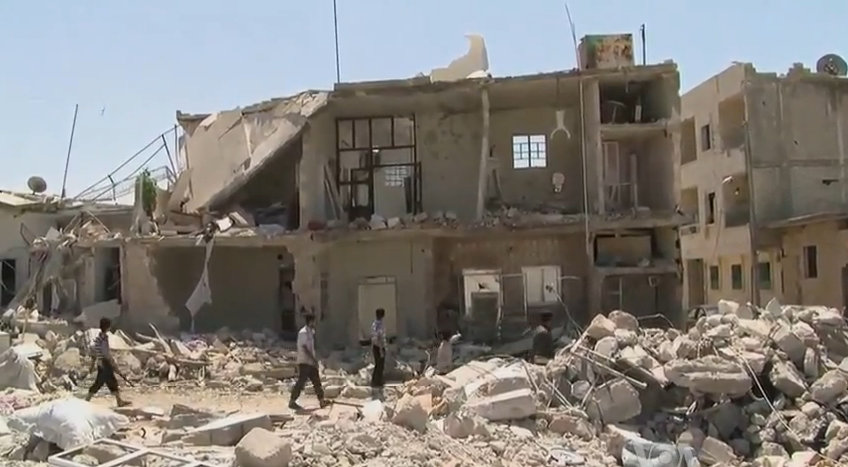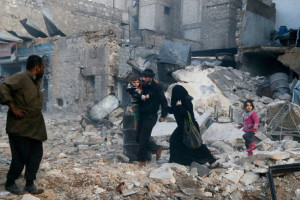
The world is looking at the Syrians who have managed to escape Syria: people who have risked everything to cross a sea in a rickety boat to seek a safer life. We touch briefly on their lives in Syria and concentrate on their perilous journey. But we risk ignoring the real crisis of the people still living inside the country. In Syria, food and water have become weapons of war: different combatants are playing with water supplies in big cities like Aleppo, Damascus and Dara’a. In Syria, more than half the population have been forced out of their homes and more than 422,000 are living in besieged areas which cannot be reached by humanitarian agencies, according to the latest report of the UN Secretary General to the Security Council on Syria in August.
Last February, you might have seen the gruesome pictures from Yarmouk on the outskirts of Damascus. Before 2012, Yarmouk was a thriving suburb of 200,000 Palestinians and Syrians, living together in relative harmony. It was a lively and noisy place, buoyant and full of commerce. By February 2015, there were only 18,000 people left and they were gradually being starved, pawns in the battle for the outskirts of Damascus. The UN admits that no aid has been able to get through to Yarmouk since March 2015, but who is talking about those poor people now?
Moving battle lines make different areas of the country vulnerable to becoming besieged. Today it is Deir Ez Zor or Zabadani that are frontlines of battle; yesterday it might have been Idlib and Hasakieh; and always it is Aleppo, and always it is civilians seeking to continue their lives in their own homes who get caught in the middle.
The battles too have grown fiercer. A Kurdish women friend in Hasakieh told me 18 months ago about how they tried to talk to the ISIS fighters and explain that Kurds were Sunni Muslims too, but these foreigners (as she described them) knew too little Arabic to have a conversation. Nowadays it is only guns that talk and women stay well clear. We forget too easily how the context of battle is as dynamic as the frontlines. We forget how dramatic the effect of lost opportunities for dialogue or assistance.
Every day in Syria people are risking their lives just to survive. Market places in Aleppo have become favourite targets of the regime’s barrel bombs. People pray for cloudy days because that makes it more difficult for the helicopters. The horror of daily life is hard to imagine. And the world is largely silent.
At September’s meeting of the UN Human Rights Council in Geneva there may be a chance to condemn the Syrian government for its use of barrel bombs and of indefinite detention. But don’t count on it. The UN has been ineffective in this conflict; tied up in its own determination to be neutral and not undermine national sovereignty.
Such concerns prevented any support for essential cross-border aid for too long; throughout 2012 and 2013 assistance came only from international and local NGOs. In July 2014 there was a breakthrough when UN Security Council Resolution 2165 was unanimously approved, which permitted the UN to deliver aid across battle lines and through some key border crossings. But this is not neutral aid; the government of Syria is notified of each delivery in advance. It is hard to see how this fits into the key principles of humanitarian action: humanity, neutrality and independence. And yet it is vital to the 4.6 million people in urgent need in so-called ‘hard to reach’ areas inside Syria.
This cross-border aid, whether delivered through the UN or through local or international NGOs, is all delivered by Syrians. It is negotiated through myriad frontlines every day by Syrian civilians working for international and local organizations, and in all cases it is delivered by brave Syrians who are putting their own lives in danger to help their fellow citizens. So, as we watch in admiration the Germans welcoming thousands of refugees to Berlin and Munich, let’s remember that these refugees are the lucky ones; those they left behind need our help, too. And all of them need us to push our governments to work much harder for an end to the horror of barrel bombs, to push for a ceasefire and a peaceful solution to this terrible conflict.
source

More Stories
Navalny’s death used to hide western failures in Ukraine and their support for Israel’s genocide
Gifts from Gaza
Vulture capital circles over the corpse of Ukraine…